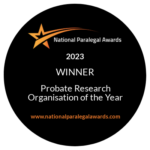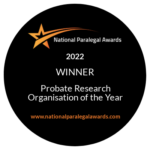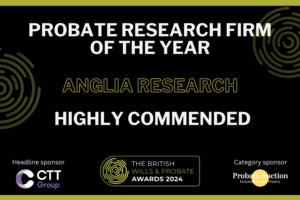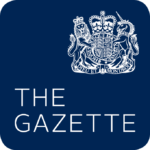How genealogy and oral history can help vulnerable clients

Senior woman and female nurse are showing thumbs up
Over the past two years, Anglia Research has developed an innovative service with the Money Carer Foundation (MCF), finding long-lost relatives for their clients and developing resources to provide them and their carers with opportunities for understanding and reminiscence. It’s a natural extension of our work locating heirs and can make substantial improvements to a client’s quality of life, bringing families back together and helping people whose memories are failing to retain a sense of their identity and history.
When people who have lost mental capacity come to the attention of their local social services team, often very little is known about their family or their past. Many clients can provide this information themselves, but some can’t.
“We call this ‘the information vacuum,’” says Eileen Butcher, who handles client referrals from MCF. “Our job is to replace the vacuum with concrete details: the names and contact details of relatives who will get in touch with the client and potentially visit.”
“For example, Susan Crawford had no known relatives and wasn’t sure whether she was widowed or divorced. All I had to go on was her name and date of birth. I traced her family tree in much the same way as I would for a probate genealogy case and discovered that she was a widow and had no children.
“However, I managed to track down three nieces, a sister in law and, best of all, a brother who was still living. All five were potential visitors and, with their permission, their contact details were passed to Susan’s care home where staff helped her to get in touch with them.”
A world of difference
Eileen has now handled 90 of these cases and while it takes time and sensitivity to reunite relatives, her work has resulted in numerous success stories.
“Sometimes the simplest thing can make the world of difference,” she says. “When a client has lost the contact details of all her family, but remembers that she used to chat to her sister regularly on the phone, it’s wonderful to be able to trace the sister so that the phone calls can continue.”
Of course, it’s not always possible to bring families back together. However, researching a client’s background can still provide numerous benefits – and this is where the Books for Memories project comes in.
“It makes sense to gather as much information as you can about a client’s background and use it to improve the quality of their care and their enjoyment of life.” Sean Tyrer, CEO, The Money Carer Foundation.
Books for Memories
Anglia Research set up Books for Memories with the aim of combining the company’s genealogical expertise with oral history and life-book work to create resources that restore the dignity of a client’s life story and foster a sense of identity.
“The first question we ask ourselves is ‘who is this book for?’” explains Dan George, who works as an interviewer and researcher on the project.
“Of course, the obvious answer is ‘the client’, but sometimes their physical or mental difficulties mean that we have to tailor the material for carers, who can then use it to engage with the client.”
Helping Aleksandra feel at home
“This is the approach we took with Aleksandra, a client in her nineties whose care home was keen to find new ways to engage with her.
“When I met Aleksandra she was quite isolated, although she was well looked after. She had arrived in the UK after the Second World War and obviously had a good grasp of English, but as her dementia advanced she reverted to her native Serbian more and more.
“She had a few photographs and we were able to piece together much of her life since she’d been in Britain. However, she had deliberately cut off contact with her Serbian relatives many years ago, and the time and cost of tracing them was prohibitive. As a result, we had to think outside the box, and we decided to focus a substantial section of Aleksandra’s memory book on the culture and customs of her homeland.
“Our aim was to create a resource that would stimulate memories for Aleksandra and at the same time provide carers with much needed background information. Even something as simple as knowing how to say ‘hello’ or ‘you look nice today’ in someone’s native language can have a big impact.
“This approach proved amazingly fruitful and resulted in a number of practical interventions – from the care home ordering Serbian delicacies for her from a specialist deli and organising a visit from the priest of the Serbian Orthodox church she had once attended, to the activities coordinator at the care home using Serbian music, song and dance to engage her interest.”
Of course no two clients are alike, and when Dan recently worked with a man in his fifties who had memory difficulties as a result of a brain injury, he took a very different approach.
“This was a case where a straightforward biography seemed more appropriate,” he says.
“Our client had had a very successful career prior to his accident and the memory book is a permanent record of that, to help remind him, as well as carers and family of his hard work and achievements.
“However, although our approach differs from client to client, there’s always one thing that remains constant in every case we take on – and that’s our intention to use what we learn about someone’s past to improve their quality of life in the present.”
(For reasons of confidentiality, names and other identifying features have been altered.)
2026 Anglia Research Services All Rights Reserved.
Anglia Research and Anglia Research Services are trading names of Anglia Research Services Limited, a company registered in England and Wales: no. 05405509
Marketing by Unity Online









